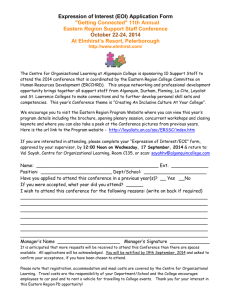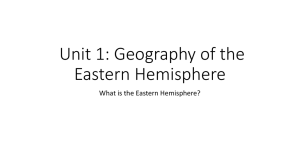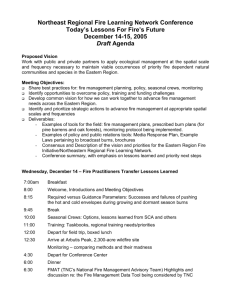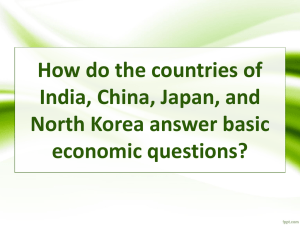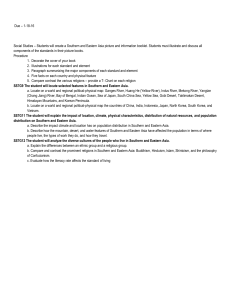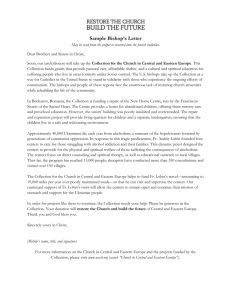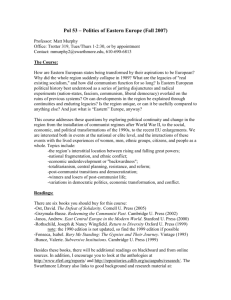MODULE TITLE: POL3051 The Changing Face of Eastern Europe
advertisement
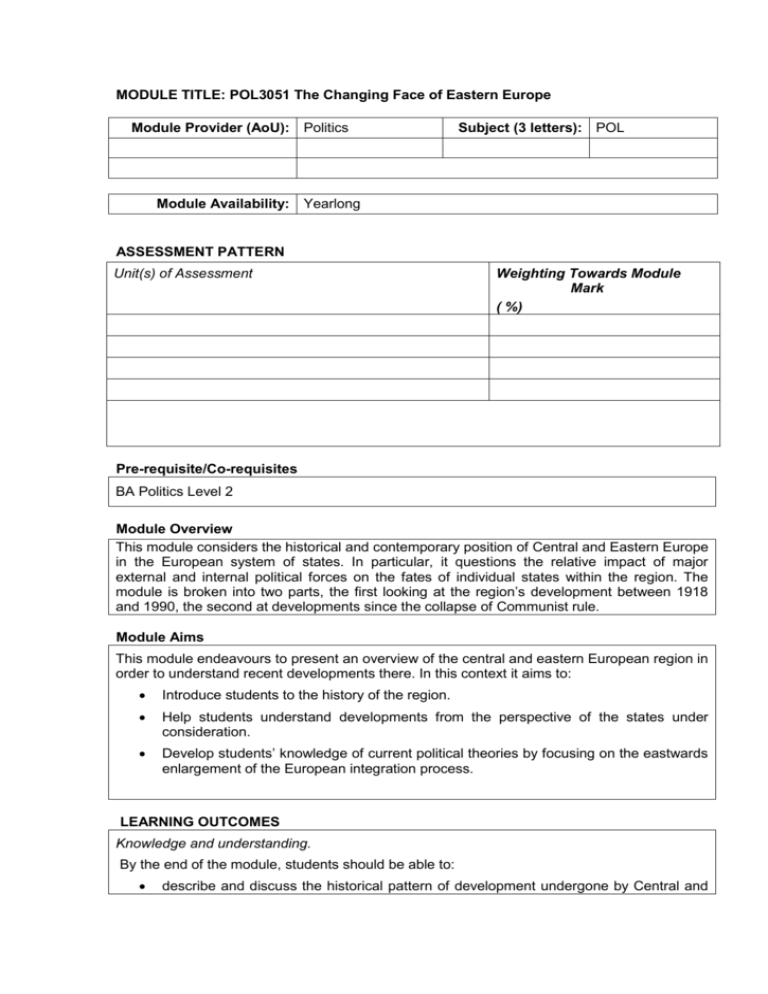
MODULE TITLE: POL3051 The Changing Face of Eastern Europe Module Provider (AoU): Politics Module Availability: Subject (3 letters): POL Yearlong ASSESSMENT PATTERN Unit(s) of Assessment Weighting Towards Module Mark ( %) Pre-requisite/Co-requisites BA Politics Level 2 Module Overview This module considers the historical and contemporary position of Central and Eastern Europe in the European system of states. In particular, it questions the relative impact of major external and internal political forces on the fates of individual states within the region. The module is broken into two parts, the first looking at the region’s development between 1918 and 1990, the second at developments since the collapse of Communist rule. Module Aims This module endeavours to present an overview of the central and eastern European region in order to understand recent developments there. In this context it aims to: Introduce students to the history of the region. Help students understand developments from the perspective of the states under consideration. Develop students’ knowledge of current political theories by focusing on the eastwards enlargement of the European integration process. LEARNING OUTCOMES Knowledge and understanding. By the end of the module, students should be able to: describe and discuss the historical pattern of development undergone by Central and Eastern European states since the late C19th Century; critically analyse the main political impact of Communism on these states; evaluate the various transitions these states have undergone; apply theoretical models and concepts to events. Cognitive skills Students will learn how to: gather, organise and deploy evidence, data and information from a variety of secondary and some primary sources; construct reasoned argument, synthesise relevant information and exercise critical judgement; reflect on their own learning and seek and make use of constructive feedback; apply theoretical frameworks to policy/empirical analysis. Practical and Transferable skills Students should be able to: make appropriate use of information and communications technology develop effective oral and written skills; work independently in order to manage workloads effectively; think and argue critically. MODULE CONTENT Topics are likely to include: The Historical Overview: The Balkan Wars – from San Stefano to World War I Delimiting the Boundaries in and of Europe The Russian Revolution: origins and effects Democratisation in the Interwar Period The Communist Takeover The Communist Years: The Secret Speech, Failed Revolutions, Modernisation The Region Today The Fall of the Berlin Wall The Politics of Accession and Security: NATO and EU Membership The Politics of Identity A ‘New Europe’? Perspectives on the future of a Unified Europe. METHODS OF TEACHING/LEARNING Seminars, prescribed reading, independent study and Post-Communist Studies, 40, 3: 269-80. Berend, Ivan T (2005) ‘What is Central and Eastern Europe?’ in European Journal of Social Theory, 8, 4: 401-16 Berglund, Sten, Ekman, Joakim & Aarebrot, Frank H (eds) (2004) The Handbook of Political Change in Eastern Europe, Cheltenham: Edward Elgar Crampton, R J (1997) Eastern Europe in the Twentieth Century and After, London: Routledge Dawson, Andrew H & Fawn, Rick (eds.) (2002) The Changing Geopolitics of Eastern Europe, London: Frank Cass Longworth, Philip (1997, 2nd ed.) The Making of Eastern Europe, Hants: MacMillan Press Pettai, Vello & Zielonka, Jan (eds) (2003) The Road to the EU vol 2, Lithuania, Estonia & Latvia, Manchester University Press Rupnik, Jacques & Zielonka, Jan (eds.) (2003) The Road to the EU - Vol 1: The Czech & Slovak Republics, Manchester University Press Seleny, Anna (2007) ‘Communism’s Many Legacies in East-Central Europe’ in Journal of Democracy, 18, 3: 156-70 White, Stephen et al (eds,) (2007) Developments in Central & East European Politics 4, Basingstoke: Palgrave MacMillan



